[From the scene] ‘Manse!’: Koreans celebrate centennial of March 1 Independence Movement
By Ock Hyun-juPublished : March 1, 2019 - 17:04
Some 2 kilometers away from where a protest for liberation from Japan began at a park 100 years ago, thousands of South Koreans poured into the streets of central Seoul on Friday to mark the March 1 Independence Movement.
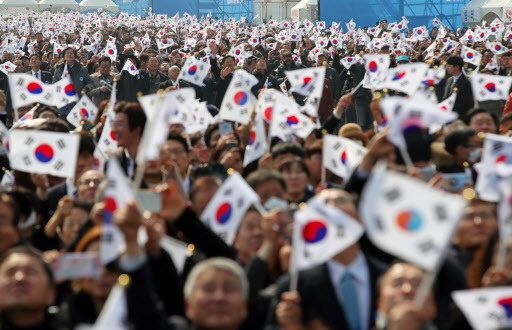
Turning central Seoul into a sea of national flags, nearly 10,000 citizens came together to remind themselves of March 1, 1919, when Koreans staged a nonviolent protest across the nation and waved the national flag against Japan’s 1910-45 colonial rule.
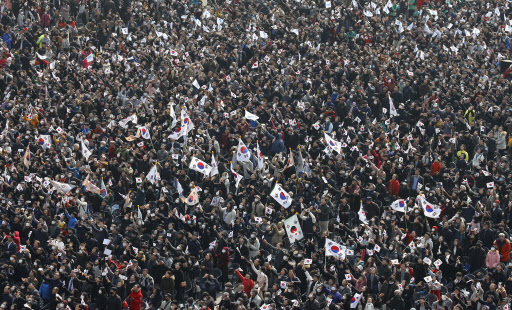
A government-hosted ceremony took place at Gwanghwamun Square in
Seoul, with celebratory events held in other major cities as well.
Those who were invited -- including 35 representatives of patriots, descendants of independence fighters and wartime sexual slavery victims -- attended the event alongside President Moon Jae-in after marching around the square holding an older version of the national flag.
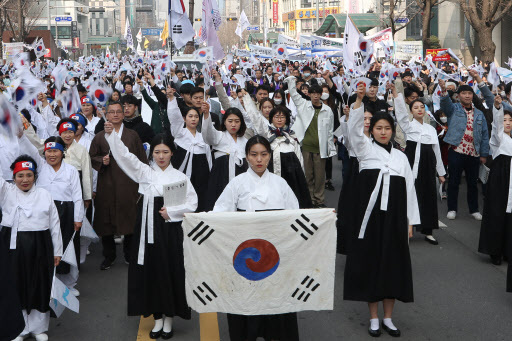
During the ceremony, Yu Gwan-sun, who triggered the independence movement and became a symbol of the country’s fight for liberation from Japan’s colonial rule, posthumously received the Republic of Korea medal.
At noon, Koreans across the nation shouted “manse” together at different locations, re-enacting the independence movement, with images livestreamed on screens at the square.
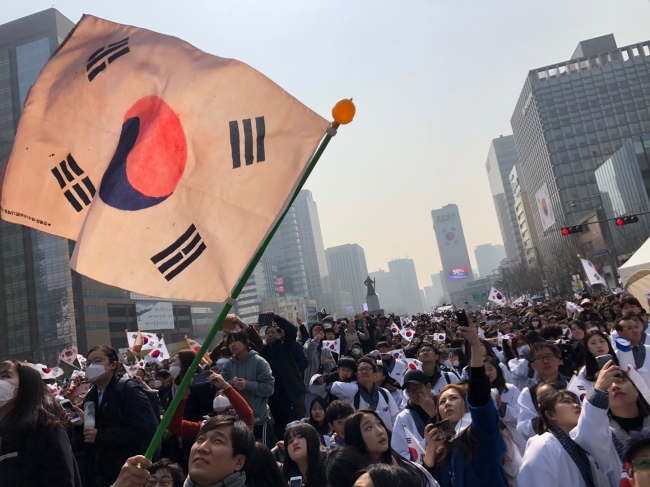
Citizens watched the event through large screens set up around the square, packing the venue behind the King Sejong statue and surrounding areas.
Despite bad air pollution throughout the day, many of the participants came with their families, with parents seeking to teach their children about the sacrifice independence fighters made to resist Japan’s occupation of the Korean Peninsula.
“I am very touched that Koreans are here as one, feeling gratitude for our independence fighters,” said Song Mi-rae, 39, who was attending the celebratory event with her three children. “I want to teach them how grateful they should be to those who courageously sacrificed themselves to protect this nation and bring peace.”
Following the main ceremony, a series of events were held in the afternoon by some 1,000 civic organizations and religious groups on the boulevard connecting Gwanghwamun Square and City Hall.
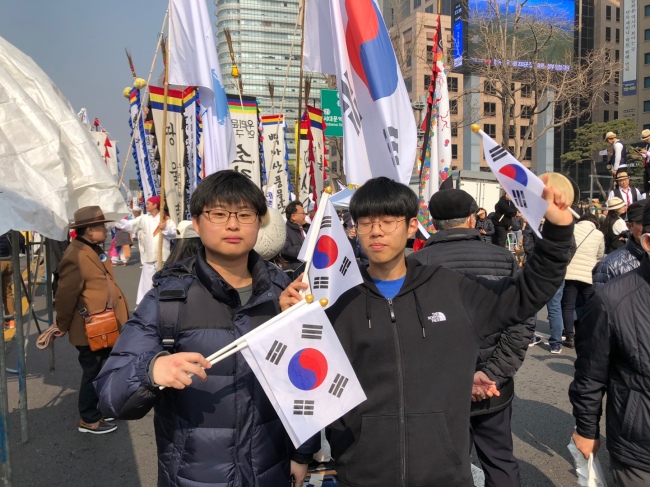
“I came here to honor the fight against Japan’s occupation of the Korean Peninsula. It is so much fun to wave the national flag with other citizens and watch the traditional musical performances,” said Yoon Tae-min, 19, who came with a friend.
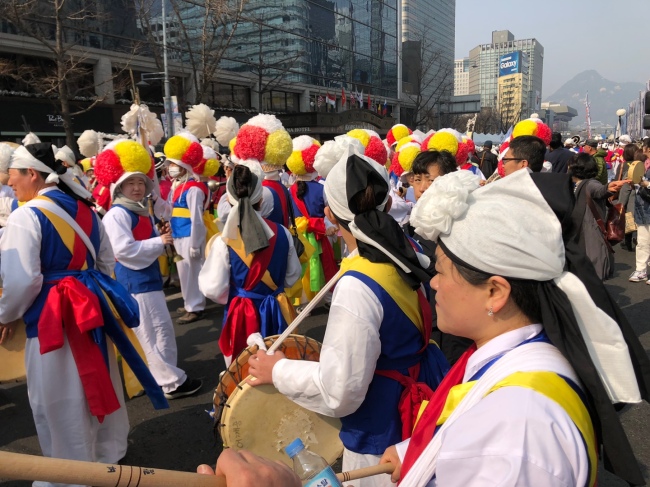
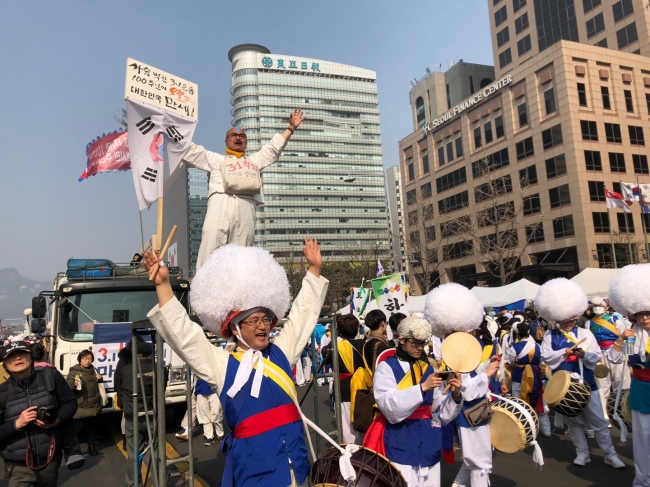
The 10-lane road was cleared of traffic for events such as re-enacting the independence protests, folk music performances and other activities, including tug-of-war and the beating of Korean drums.
Foreigners also took part in the festivities. Some were spotted watching Korean folk music performances by hundreds of people in Korean traditional costumes.
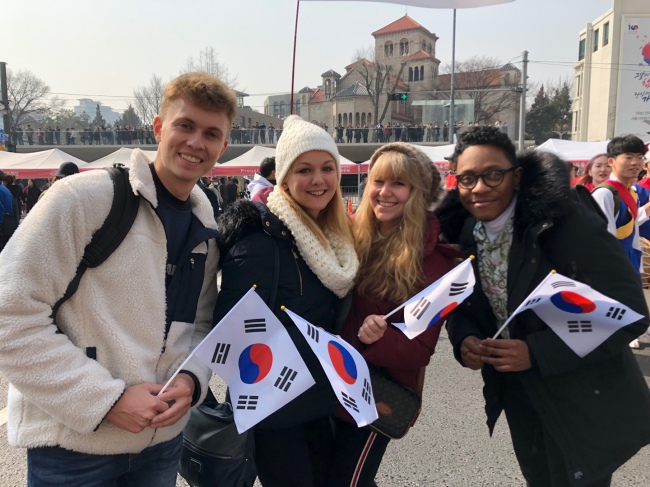
“We heard it is a national holiday, and there is this parade. We came here to join Koreans celebrating it,” said Isabel Faller, 22, a German exchange student, after taking a picture with her friends and Koreans in traditional costumes with the parade in the background.
The outer wall of Deoksugung was covered with a 630-meter-long white cloth to symbolize the funeral of Gojong, the last king of the Joseon Kingdom and the first emperor of the Daehan Empire, who died mysteriously in January 1919.
Historians say the king’s sudden death during confinement by colonial Japan served as a catalyst for the independence movement in which more than 2 million Koreans participated in over 2,000 demonstrations to call for liberation from Japan’s harsh rule.
The Korean national flag -- Taegeukgi – of different sizes and designs were also featured on the exterior of buildings surrounding Gwanghwamun Square. At the time of the independence movement, different versions of Taeguekgi were used because there was no unified version.
By Ock Hyun-ju (laeticia.ock@heraldcorp.com)
-
Articles by Ock Hyun-ju


![[AtoZ into Korean mind] Humor in Korea: Navigating the line between what's funny and not](http://res.heraldm.com/phpwas/restmb_idxmake.php?idx=644&simg=/content/image/2024/04/22/20240422050642_0.jpg&u=)


![[Exclusive] Korean military set to ban iPhones over 'security' concerns](http://res.heraldm.com/phpwas/restmb_idxmake.php?idx=644&simg=/content/image/2024/04/23/20240423050599_0.jpg&u=20240423183955)
![[Herald Interview] Why Toss invited hackers to penetrate its system](http://res.heraldm.com/phpwas/restmb_idxmake.php?idx=644&simg=/content/image/2024/04/22/20240422050569_0.jpg&u=20240422150649)
![[Graphic News] 77% of young Koreans still financially dependent](http://res.heraldm.com/phpwas/restmb_idxmake.php?idx=644&simg=/content/image/2024/04/22/20240422050762_0.gif&u=)







![[Exclusive] Korean military to ban iPhones over security issues](http://res.heraldm.com/phpwas/restmb_idxmake.php?idx=652&simg=/content/image/2024/04/23/20240423050599_0.jpg&u=20240423183955)



![[Today’s K-pop] Ateez confirms US tour details](http://res.heraldm.com/phpwas/restmb_idxmake.php?idx=642&simg=/content/image/2024/04/23/20240423050700_0.jpg&u=)